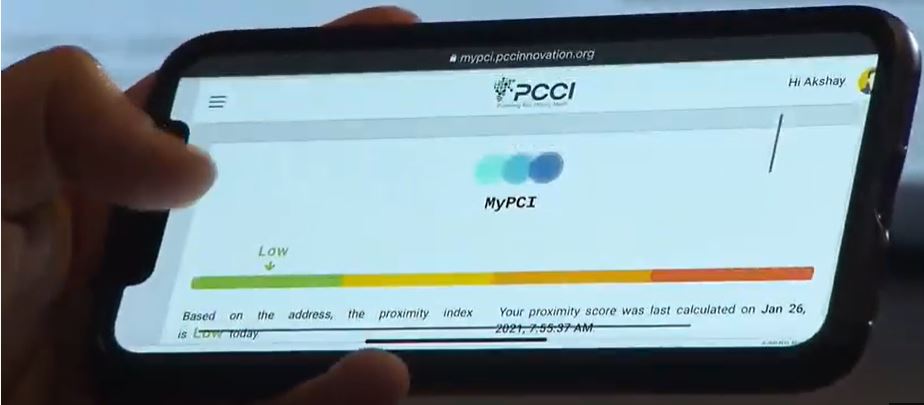PCCI’s New MyPCI App Informs Individuals of COVID-19 Exposure Risk
Rating tool for measuring COVID-19 risk adopted by the Diocese of Dallas Catholic Schools
Dallas, Texas – Parkland Center for Clinical Innovation (PCCI), which improves healthcare for vulnerable populations using advanced data science and clinical experts, has released the MyPCI App, a solution, exclusive to Dallas County, that will help individuals make informed choices by providing an on-demand, location-based personal risk assessment of possible COVID-19 exposure.
The MyPCI App, free to register and use, is a secure, cloud-based tool that doesn’t require personal health information and doesn’t track an individual’s mobile phone data. Instead, it is a sophisticated machine learning algorithm, geomapping and hot-spotting technology that uses daily updated data from the Dallas County Health and Human Services (DCHHS) on confirmed positive COVID-19 cases and the population density in a given neighborhood. Based on density and distances to those nearby who are infected, the MyPCI App generates a dynamic personal risk score.
To use the MyPCI App, go to, https://pcci1.wpengine.com/mypci/, click on the link and register (Using code: GP-7xI6QT). Registration includes a request for individual location information that will be used only for generating a risk assessment, never shared. Once registered, simply login daily and a COVID-19 personal risk level score will be provided along with information to help individuals make informed decisions about how to manage their risk.
“Proximity continues to remain one of the most important factors in pandemic management and personal protection,” said Steve Miff, PhD, PCCI’s President and CEO. “While we wait to receive a vaccine, we can control our own risk of exposure and help bend the curve. The MyPCI App is a simple to use tool that will give you an understanding of the COVID-19 risks in your vicinity and reinforce the need for social distancing, face covering and hand washing.”
(continue below video)
The MyPCI App is based on highly effective technology that has already been proven in the field. The app is built on the PCCI COVID-19 Proximity Index designed for the Parkland Health & Hospital System. The Proximity Index looked at the proximal risk score of patients who were scheduled for in-person medical appointments. If a person was identified at high or very high risk, the appointment was proactively shifted from an in-person visit to a telephonic or virtual visit – protecting both patients and health care providers. Also, timely screening and care plan was offered proactively. Data analyses from over 500,000 Parkland patients indicates that an individual with a high or very high proximity index had a seven times higher risk of ending up being infected. The success of this Parkland program has prompted additional development of the tool that is now available to the public as the MyPCI App.
“I am pleased that PCCI is making this service available to the public, as it uses the same tool which has helped us at Parkland better care for the Dallas County community by providing important information that indicates one’s risk for developing COVID,” said Brett Moran, MD, Chief Medical Informatics Officer for Parkland. “Parkland and PCCI have been using these algorithms from early in the pandemic to effectively provide outreach to high-risk individuals which helps them as well as their family, friends and the community at large.”
To ensure all residents of Dallas County can use this tool to empower themselves with better information, the MyPCI App is also available at Parkland at https://www.parklandhospital.com/information-about-coronavirus-disease-2019-covid19, using PARK-xaoHtR registration code. It is also available at the Dallas County Health and Human Services Department at http://www.dallascounty.org/covid-19/ using DCHHS-62ta7b registration code.
“We have been pleased throughout this pandemic to be partnering with PCCI so that we can use their cutting-edge technology and data applications to address COVID-19,” said Dr. Philip Huang, MD, MPH, Director of Health and Human Services for Dallas County. “This latest tool is another example of how Dallas County benefits from the tremendous resources and partnerships we have here.”
An early, enterprise-wide adopter of the MyPCI App is the Diocese of Dallas Catholic Schools, to help better inform its student’s parents. The Diocese of Dallas Catholic Schools represents more than 61,000 students in 38 different schools, many of which are in Dallas County. Parents using the MyPCI App will receive information allowing them to work collaboratively with teachers and administrators in an informed way.
“We are always looking to innovate and partnering with PCCI on this initiative is a great opportunity to empower our parents and families with information that makes then engaged partners with our team in containing the virus and keeping our staff and students safe,” said Matt Vereecke, Superintendent of Schools, Catholic Diocese of Dallas.
A goal for PCCI in rolling out the MyPCI App, is to give tools and information to help Dallas County residents to make the most informed decisions possible as the COVID-19 pandemic continues to spread and while the vaccination program becomes more widespread.
“The key for all residents of Dallas County to help mitigate the spread of COVID-19 is to register and use the MyPCI App as quickly as possible,” said Dr. Miff. “While we are very encouraged by the vaccination initiatives, they will take time take, which means now is not the time to let our guard down. The pandemic is still raging, so we need to use personal information and awareness about our own individual and household risks to re-enforce and manage the things that we can control while we wait for broad implementation of vaccines.”
About Parkland Center for Clinical Innovation
Parkland Center for Clinical Innovation (PCCI) is an independent, not-for-profit, healthcare intelligence organization affiliated with Parkland Health & Hospital System. PCCI leverages clinical expertise, data science and Non Medical Drivers of Health to address the needs of vulnerable populations.
###



